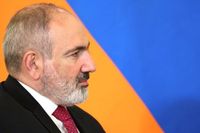Armenian Prime Minister Nikol Pashinyan traveled to Moscow on May 9, 2025, to participate in the annual parade commemorating the 80th anniversary of Victory in World War II. His attendance at this significant event was confirmed during a parliamentary session where he emphasized the importance of such commemorations, stating, "Of course, this event is very important in the context of the victory in World War II. But at these events, issues of the bilateral agenda are also discussed. It would be wrong to miss such meetings." This visit comes at a time of heightened scrutiny regarding Armenia's relationship with Russia and the West.
Political scientist Lilit Dallakyan has pointed out that Pashinyan's visit should not just be a ceremonial appearance. She believes he should utilize the opportunity to address pressing issues between Armenia and Russia, particularly regarding the return of prisoners of war, a matter that falls under the obligations Russia assumed in the statement of November 9, 2020. Dallakyan remarked, "If Pashinyan decided to go, he must at least ensure some progress on this issue." This perspective highlights the delicate balance Pashinyan must navigate during his visit.
Amidst growing concerns that Pashinyan's trip could strain Armenia's relations with Western nations, he reassured the parliament that Armenia is pursuing a balanced foreign policy. He stated, "We are conducting a balanced and equidistant foreign policy. And it does not imply that we will build our relations in one direction at the expense of others." His comments reflect an attempt to assuage fears that his visit might be interpreted as a step back from Western alignment.
Despite these reassurances, the political landscape remains complex. Dallakyan expressed skepticism about Pashinyan's policies, stating that they are often incomprehensible to the Armenian people and only later to the West. She noted that "the presence in the South Caucasus comes from Russia's interests," suggesting that Armenia's reliance on Russia could hinder its progress.
High-ranking Armenian officials have indicated that the withdrawal of Russian border guards from Armenia's borders is a political issue rather than a logistical one. Currently, Armenian border guards manage the borders with Georgia and Azerbaijan, while Russian forces oversee the borders with Turkey and Iran. This arrangement stems from an interstate agreement signed with Russia in September 1992, shortly after the dissolution of the Soviet Union.
In a notable absence, Azerbaijani President Ilham Aliyev will not attend the Moscow parade. According to Russian presidential aide Yuri Ushakov, Aliyev will be occupied with events commemorating Heydar Aliyev, the former president of Azerbaijan. Dallakyan interprets Aliyev's absence as a deliberate message to the West, suggesting he wants to position himself as a constructive leader opposing Russian aggression in Ukraine. She stated, "If Pashinyan goes to Moscow, he should at least congratulate Zelensky and the Ukrainian people on their victory over fascism in a separate letter. This would somewhat soften the circumstance that Armenia participates in the parade in Moscow."
The dynamics between Pashinyan and Lukashenko, the Belarusian president, also came into focus during the parade. They were seated next to each other, marking their first personal encounter since a tense exchange last December during a meeting of the Supreme Eurasian Economic Council in St. Petersburg. At that time, Lukashenko had criticized Pashinyan's leadership, suggesting he was leading Armenia toward destruction. He remarked, "Calm him down. He will destroy Armenia. He has problems on the east, problems on the west. He is even turning Russia against himself." This history adds another layer of complexity to their interactions.
As Pashinyan navigates these multifaceted relationships, the stakes are high. The upcoming parliamentary elections in Armenia, scheduled for 2026, loom large on the political horizon. Dallakyan warned that hybrid warfare tactics are being employed against Armenia, particularly through Russian media, which she claims attempts to influence political outcomes. She stated, "A lot of money is being spent, money coming from abroad, especially from our northern neighbor. Hybrid warfare is being waged in Armenia." This context underscores the importance of Pashinyan's diplomatic strategies.
In summary, Pashinyan's visit to Moscow on May 9, 2025, is laden with significance, not only as a commemoration of historical victory but also as a critical juncture for Armenia's foreign policy. The challenges he faces are multifaceted, requiring a careful balance between maintaining ties with Russia while also addressing the concerns of the Armenian populace and the West. As he prepares for the parade, the implications of his discussions, or lack thereof, with Russian leaders could resonate far beyond the immediate diplomatic landscape.

